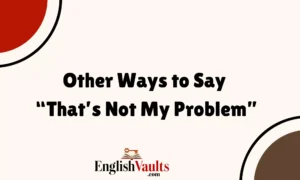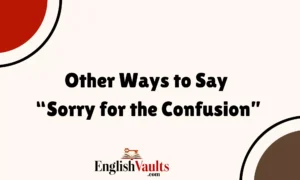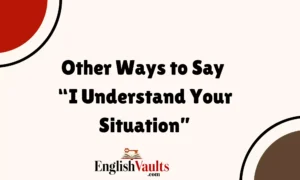In professional settings, it’s crucial to express disinterest or lack of concern diplomatically. How you convey this sentiment can significantly impact workplace relationships and communication effectiveness. Here are 25 professional ways to express that you are indifferent to a particular issue, complete with scenarios and contextual usage.
List of 25 Professional Ways to Say “I Don’t Care”
- 1. “I’m not particularly concerned about this matter.”
- 2. “I don’t have a strong opinion on this issue.”
- 3. “I’m indifferent to the outcome.”
- 4. “This isn’t a priority for me at the moment.”
- 5. “I don’t have any particular interest in this topic.”
- 6. “I’ll defer to your judgment on this.”
- 7. “I’m okay with whatever you decide.”
- 8. “I don’t have any strong feelings about this.”
- 9. “This isn’t something I’m particularly invested in.”
- 10. “I’m fine with any approach you choose.”
- 11. “I’m not particularly invested in the details.”
- 12. “I’ll leave this decision up to you.”
- 13. “I’m not invested in this particular issue.”
- 14. “I’m flexible regarding this matter.”
- 15. “I don’t have a strong preference here.”
- 16. “I’m indifferent to the specifics.”
- 17. “I’m not particularly focused on this right now.”
- 18. “I have no strong objections to this.”
- 19. “I don’t see this as a major concern.”
- 20. “I’m comfortable with whatever you choose.”
- 21. “I don’t have strong preferences on this matter.”
- 22. “I’m okay with whatever direction you take.”
- 23. “I don’t have a specific stance on this issue.”
- 24. “I’m not particularly engaged with this topic.”
- 25. “I’m not focused on this right now, so feel free to proceed.
1. “I’m not particularly concerned about this matter.”
Scenario: Subject: Re: Project Timeline
Hi Leo,
Thank you for updating me on the revised project timeline. I’ve reviewed the new schedule, and I’m not particularly concerned about this matter at the moment. Please proceed with the changes as planned, and let me know if any further action is required from my side.
Best regards, Henry
Expert Insight: This phrase indicates that while you are aware of the issue, you do not see it as significant enough to warrant further attention. It’s a professional way to show that you trust the team to handle it appropriately.
2. “I don’t have a strong opinion on this issue.”
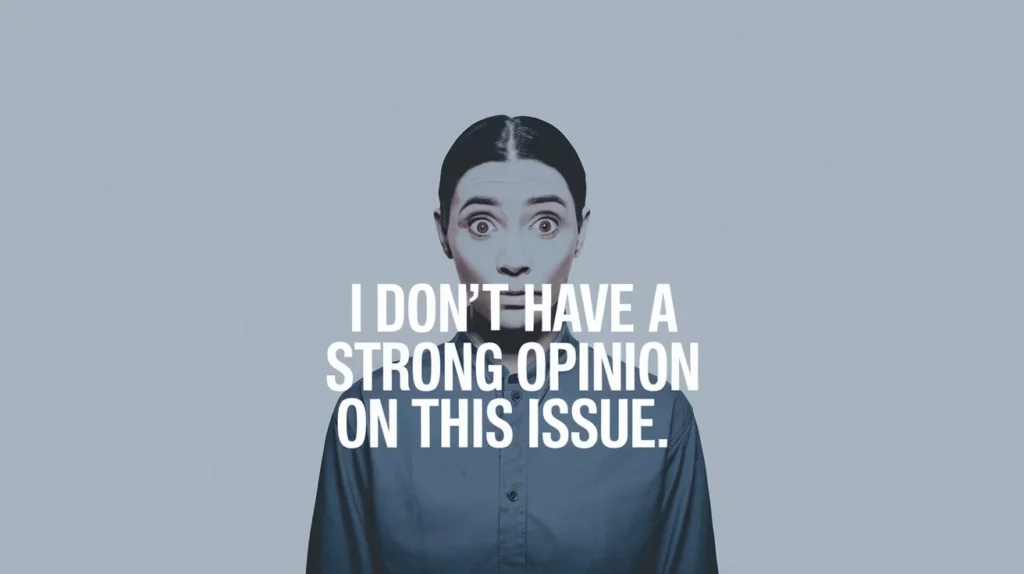
Scenario: Subject: Re: Marketing Strategy Proposal
Hi Leo,
Thank you for sharing the marketing strategy proposal. After reviewing the document, I don’t have a strong opinion on this issue. If you and the team feel confident about the approach, I’m happy to support it. Please proceed as you see fit.
Best, Henry
Expert Insight: This statement allows you to remain neutral, suggesting that while you’re open to suggestions, you don’t have specific preferences. It encourages others to take the lead in decision-making.
3. “I’m indifferent to the outcome.”
Scenario: Subject: Re: New Office Location
Hi Leo,
I appreciate the information regarding the new office location options. I’m indifferent to the outcome and trust that you and the team will select the most suitable option. Please let me know if you need any additional input from me.
Regards, Henry
Expert Insight: By stating that you are indifferent, you communicate that the decision does not impact you significantly. It subtly reinforces that you rely on others to make the best choice.
4. “This isn’t a priority for me at the moment.”
Scenario: Subject: Re: Optional Training Session
Hi Leo,
Thank you for the invitation to the optional training session. At this time, this isn’t a priority for me. However, I appreciate the offer and will consider attending if my schedule permits. Please keep me updated on future sessions.
Best wishes, Henry
Expert Insight: This phrase helps prioritize your workload and signals that while you acknowledge the opportunity, it is not currently essential for you. It’s polite yet clear about your current focus.
5. “I don’t have any particular interest in this topic.”
Scenario: Subject: Re: Team Building Activities
Hi Leo,
Thanks for outlining the potential team-building activities. I don’t have any particular interest in this topic but support whatever decision the team makes. Please feel free to proceed based on group preferences.
Sincerely, Henry
Expert Insight: Expressing a lack of interest shows respect for the initiative while making it clear that your personal engagement is minimal. It encourages others to lead with their enthusiasm.
6. “I’ll defer to your judgment on this.”
Scenario: Subject: Re: Vendor Selection
Hi Leo,
I’ve reviewed the vendor options you provided. I’ll defer to your judgment on this matter. Your expertise and insights are highly valued, and I trust you to make the best choice for our needs. Let me know if you need any further input from me.
Best regards, Henry
Expert Insight: Deferring to someone’s judgment emphasizes trust and respect for their decision-making capabilities. It also indicates that you’re comfortable with their expertise guiding the outcome.
7. “I’m okay with whatever you decide.”
Scenario: Subject: Re: Design Preferences for New Website
Hi Leo,
Thank you for presenting the design options for the new website. I’m okay with whatever you decide. I trust that you’ll choose the design that best fits our objectives. Please let me know if you need any further feedback from me.
Best, Henry
Expert Insight: This phrase communicates flexibility and openness, showing that you are not rigid about the outcome and have confidence in the decision-maker’s choice.
8. “I don’t have any strong feelings about this.”
Scenario: Subject: Re: Office Renovation Plans
Hi Leo,
Thanks for the renovation plans for the office. I don’t have any strong feelings about this and am comfortable with the direction you choose to take. If you need any additional input, please let me know.
Regards, Henry
Expert Insight: By stating a lack of strong feelings, you show that while you are aware of the plans, you are not emotionally invested. This allows others to make decisions without undue influence.
9. “This isn’t something I’m particularly invested in.”
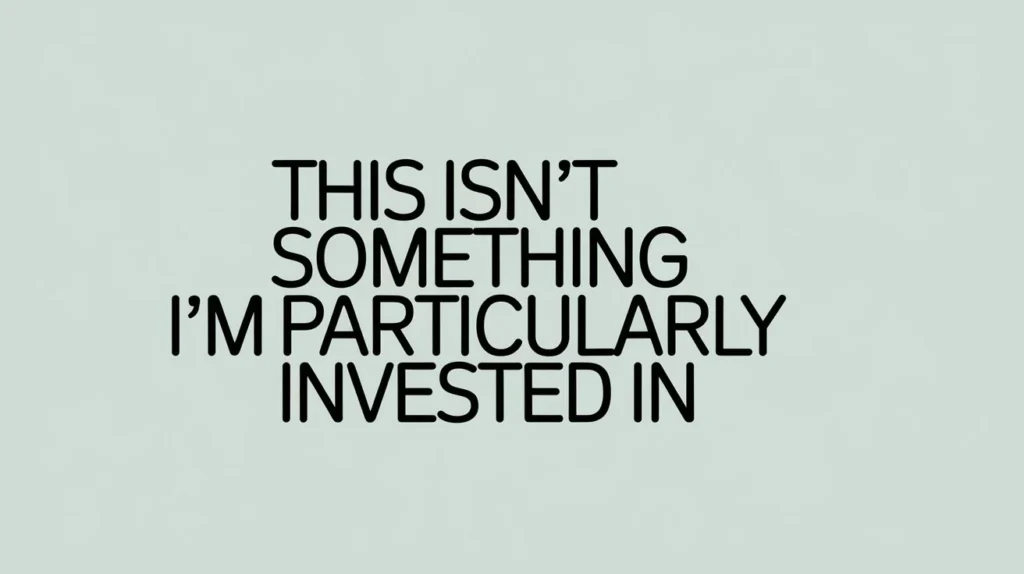
Scenario: Subject: Re: Annual Charity Event
Hi Leo,
I appreciate the information regarding the annual charity event. This isn’t something I’m particularly invested in, but I support the initiative and am happy to contribute if needed. Please let me know how I can assist.
Best wishes, Henry
Expert Insight: This approach conveys that you are not deeply engaged with the event but are supportive and willing to participate if required. It balances detachment with a willingness to contribute.
10. “I’m fine with any approach you choose.”
Scenario: Subject: Re: Project Delivery Methods
Hi Leo,
Thank you for outlining the various project delivery methods. I’m fine with any approach you choose. Please go ahead with the method that best suits our project goals. Let me know if there’s anything else you need from me.
Best regards, Henry
Expert Insight: Being open to any approach highlights flexibility and trust in the decision-making process. It indicates that you are adaptable and not set on any particular method.
11. “I’m not particularly invested in the details.”
Scenario: Subject: Re: Event Planning Details
Hi Leo,
Thanks for sharing the event planning details. I’m not particularly invested in the details and am confident you’ll handle the arrangements effectively. If there are major decisions needing my input, please feel free to reach out.
Sincerely, Henry
Expert Insight: This phrase communicates a lack of detailed interest while showing confidence in the recipient’s ability to manage the situation. It maintains a professional distance from the specifics.
12. “I’ll leave this decision up to you.”
Scenario: Subject: Re: Budget Allocation
Hi Leo,
I’ve reviewed the proposed budget allocations. I’ll leave this decision up to you, as I trust your judgment in allocating resources effectively. Please let me know if you need any further input from my end.
Best, Henry
Expert Insight: By leaving the decision up to someone else, you show confidence in their abilities and avoid micro-managing. It’s a respectful way of expressing that the matter is not a priority for you.
13. “I’m not invested in this particular issue.”
Scenario: Subject: Re: Software Update Preferences
Hi Leo,
Thank you for providing the options for the software update. I’m not invested in this particular issue and am happy with whichever option you and the team decide on. Please keep me informed of the final choice.
Best regards, Henry
Expert Insight: Expressing disinterest in a particular issue while remaining open to the team’s decision helps maintain professionalism and shows that you trust the decision-making process.
14. “I’m flexible regarding this matter.”
Scenario: Subject: Re: Team Meeting Schedule
Hi Leo,
Thanks for proposing new times for the team meeting. I’m flexible regarding this matter and am open to any time that suits the majority of the team. Please go ahead with the time that works best for everyone.
Sincerely, Henry
Expert Insight: Being flexible indicates that you are adaptable and willing to accommodate others’ preferences. It demonstrates that you value the collective decision over your personal preference.
15. “I don’t have a strong preference here.”
Scenario: Subject: Re: Design Color Schemes
Hi Leo,
I’ve looked over the proposed color schemes for the new design. I don’t have a strong preference here and am happy with whatever the design team feels is best. Please proceed with your recommendation.
Best, Henry
Expert Insight: Indicating a lack of strong preference shows that you trust the expertise of others to make the best choice. It’s a courteous way to express that your opinion is not critical.
16. “I’m indifferent to the specifics.”
Scenario: Subject: Re: New Hire Candidate Profiles
Hi Leo,
Thank you for sending over the candidate profiles for the new hire. I’m indifferent to the specifics and trust you’ll choose the candidate who best fits our needs. Please let me know if there’s anything else required from me.
Regards, Henry
Expert Insight: Being indifferent to specifics highlights that you are not focused on the minutiae but are trusting the recipient to handle the dtails effectively. It emphasizes trust and delegation.
17. “I’m not particularly focused on this right now.”
Scenario: Subject: Re: Marketing Campaign Adjustments
Hi Leo,
I appreciate the update on the marketing campaign adjustments. I’m not particularly focused on this right now, so please go ahead with the changes you think are best. If any major issues arise, feel free to let me know.
Best regards, Henry
Expert Insight: Stating that you are not focused on the matter conveys that it’s not a priority for you at this time. It allows the recipient to proceed with their work without needing your constant input, while still leaving the door open for significant issues.
18. “I have no strong objections to this.”
Scenario: Subject: Re: Office Layout Changes
Hi Leo,
Thank you for sharing the proposed office layout changes. I have no strong objections to this and am comfortable with the plans as presented. If there are any critical concerns or changes, please keep me informed.
Best, Henry
Expert Insight: This phrase conveys that you do not have any significant objections to the matter at hand. It’s a way to express acceptance while leaving room for communication if major issues arise.
19. “I don’t see this as a major concern.”
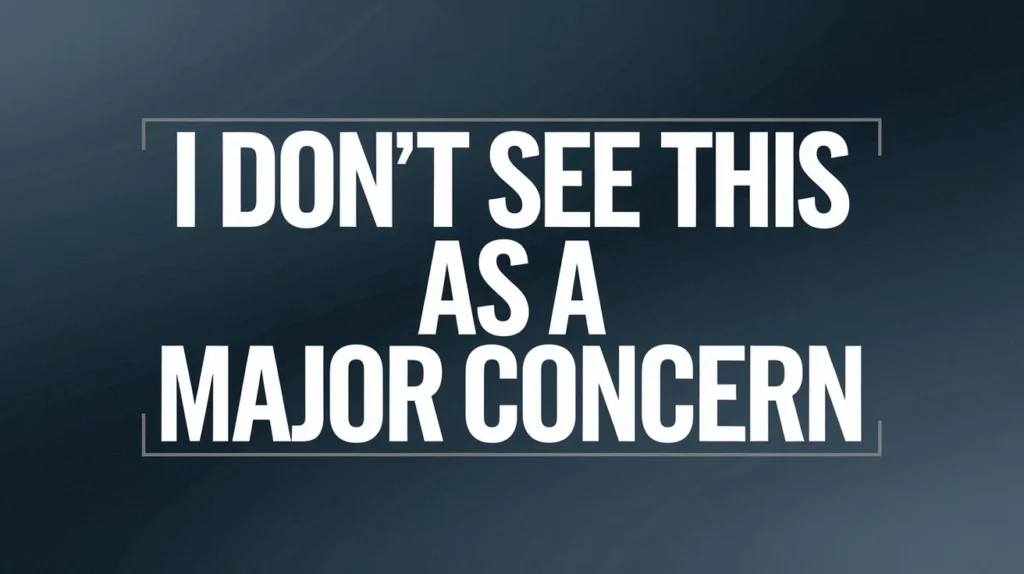
Scenario: Subject: Re: Employee Feedback Survey Results
Hi Leo,
Thanks for sending over the employee feedback survey results. I don’t see this as a major concern at the moment and am confident that the issues raised can be addressed appropriately. Let me know if you need any additional support.
Regards, Henry
Expert Insight: By indicating that you do not view the issue as major, you are providing reassurance and support while also signaling that it is not something that requires immediate action or concern from your side.
20. “I’m comfortable with whatever you choose.”
Scenario: Subject: Re: Event Venue Selection
Hi Leo,
I appreciate you taking the time to review the event venue options. I’m comfortable with whatever you choose and trust your judgment in selecting the best venue for the event. Please proceed as you see fit.
Sincerely, Henry
Expert Insight: This statement demonstrates trust and flexibility, allowing the recipient to make a decision without pressure. It shows confidence in their choice and reinforces a collaborative approach.
21. “I don’t have strong preferences on this matter.”
Scenario: Subject: Re: Product Feature Enhancements
Hi Leo,
Thank you for the suggestions on product feature enhancements. I don’t have strong preferences on this matter, so please feel free to implement the features that you believe will add the most value. Keep me updated on any major developments.
Best regards, Henry
Expert Insight: Expressing a lack of strong preferences shows that you are open to various options and trust the recipient’s judgment to select the most appropriate features. It fosters a collaborative environment where the recipient feels empowered.
22. “I’m okay with whatever direction you take.”
Scenario: Subject: Re: Software Development Priorities
Hi Leo,
I’ve reviewed the proposed software development priorities. I’m okay with whatever direction you take and trust that you’ll choose the path that best aligns with our strategic goals. Let me know if you need further input from me.
Best, Henry
Expert Insight: By indicating that you are okay with any direction, you provide the recipient with the freedom to make decisions based on their expertise. This approach helps streamline decision-making and supports efficient progress.
23. “I don’t have a specific stance on this issue.”
Scenario: Subject: Re: Customer Service Policy Changes
Hi Leo,
Thank you for detailing the proposed changes to our customer service policies. I don’t have a specific stance on this issue and am comfortable with the changes as outlined. Please proceed with implementing the updates.
Sincerely, Henry
Expert Insight: Stating that you do not have a specific stance on an issue conveys neutrality and openness to the recipient’s proposal. It also indicates that you are not deeply involved in the decision-making process but are supportive of the direction.
24. “I’m not particularly engaged with this topic.”
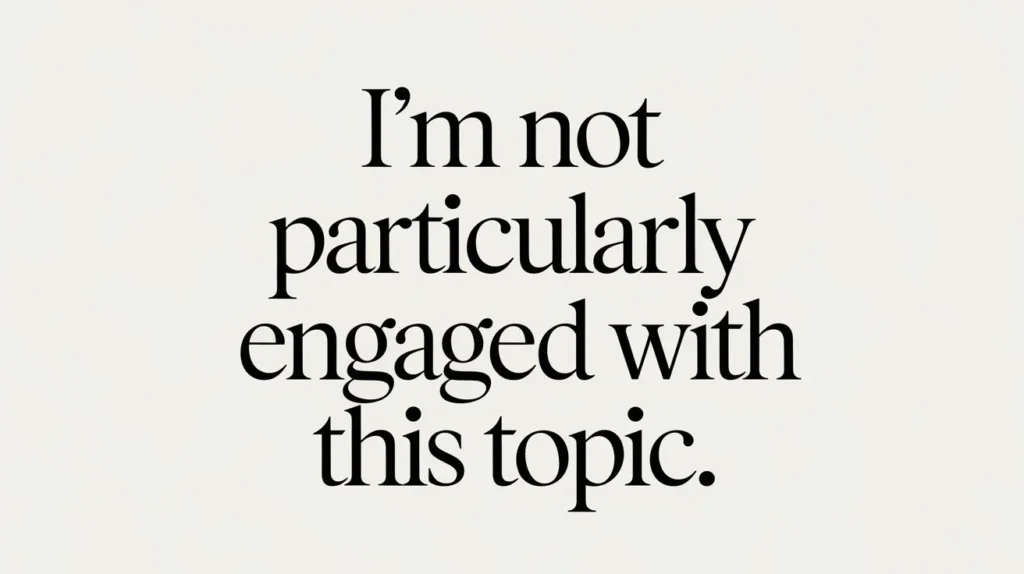
Scenario: Subject: Re: Quarterly Financial Report
Hi Leo,
Thank you for preparing the quarterly financial report. I’m not particularly engaged with this topic and trust that you’ve covered all necessary aspects. If there are any key takeaways or actions needed from me, please let me know.
Best regards, Henry
Expert Insight: Indicating a lack of engagement with a topic shows that while you are aware of it, you do not need to be actively involved. It allows the recipient to manage the topic independently while keeping you informed of any critical points.
25. “I’m not focused on this right now, so feel free to proceed.”
Scenario: Subject: Re: New Policy Implementation
Hi Leo,
I appreciate the update on the new policy implementation. I’m not focused on this right now, so feel free to proceed as planned. Please keep me posted on any major developments or issues that might require my attention.
Best, Henry
Expert Insight: This statement provides a clear indication that you are not concentrating on the matter at the moment but are comfortable with the recipient moving forward. It maintains a professional tone while allowing the recipient to advance with the implementation.
Each of these phrases and scenarios is designed to convey a lack of concern or disinterest in a professional and respectful manner. They are useful in maintaining positive working relationships and ensuring clear, effective communication without appearing dismissive.


